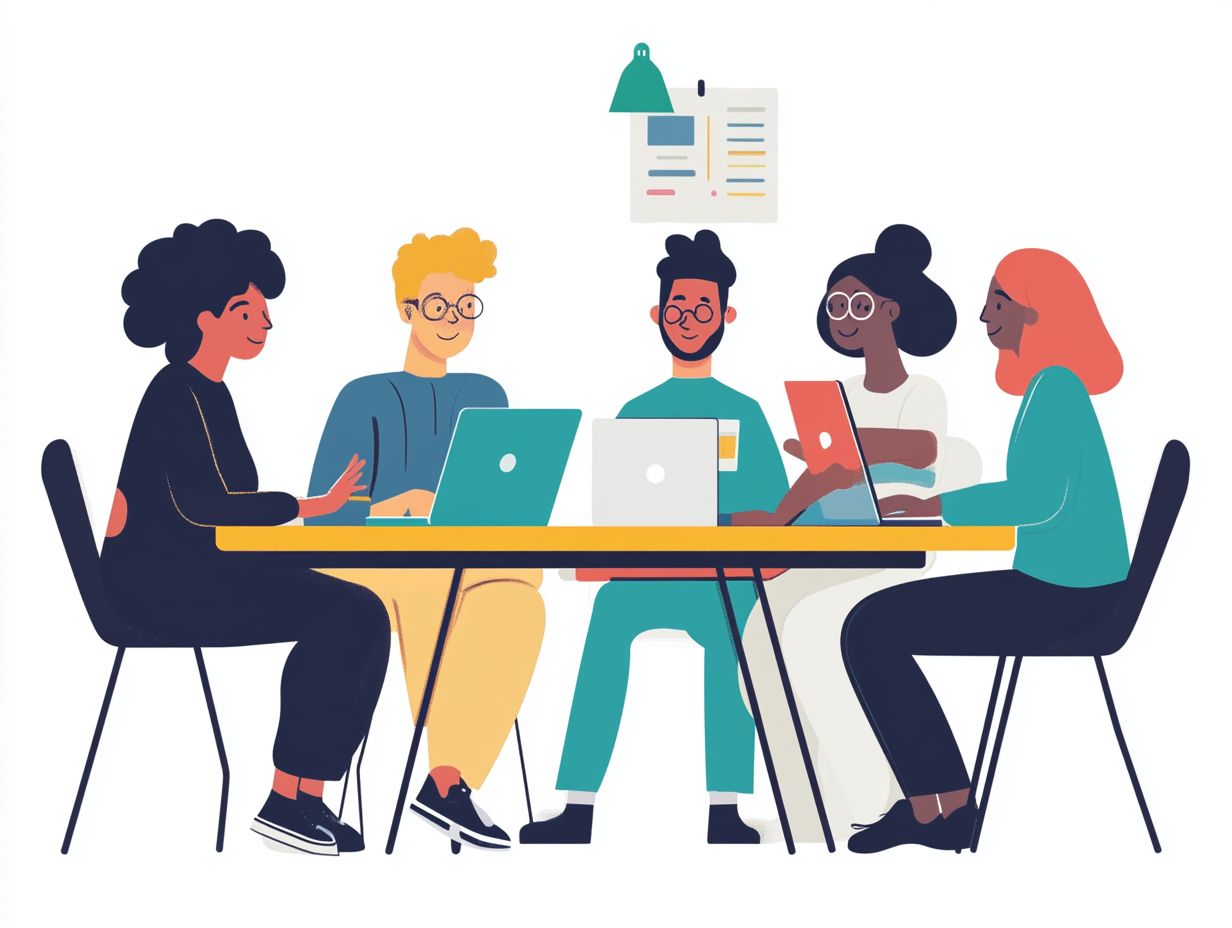5 Skills You Can Learn from Career Services
Navigating the job market can feel like traversing a labyrinth, but arming yourself with the right skills can truly elevate your journey. Get ready to dive in!
This article delves into five essential skills that career services provide. These skills are designed to help you excel in your professional endeavors. From crafting standout resumes and mastering interview techniques to refining your networking skills and building a compelling personal brand, you ll discover how these services can illuminate your path towards the right career.
Prepare to transform your job search with insightful strategies and practical advice that you can put into action!
Contents
- Key Takeaways:
- 1. Resume and Cover Letter Writing
- 2. Interview Preparation
- 3. Networking Skills
- 4. Job Search Strategies
- 5. Personal Branding
- How Can Career Services Help in Finding the Right Career Path?
- What Are the Common Mistakes People Make on Their Resumes and Cover Letters?
- What Are the Different Types of Interviews and How Can Career Services Help with Them?
- How Can Networking Help with Career Advancement?
- What Are the Best Practices for Job Searching?
- How Can Personal Branding Help in Career Growth?
- Frequently Asked Questions
Key Takeaways:

- Improve your resume and cover letter writing skills to stand out.
- Receive valuable interview preparation to help you land your dream job.
- Learn effective networking skills to expand your professional connections.
1. Resume and Cover Letter Writing
Resume and cover letter writing are essential pillars of your career planning journey. They create that all-important first impression for potential employers and play a vital role in showcasing the transferable skills that are key to your success.
These documents highlight your experiences. They show how your abilities match the job requirements. When crafting your resume, it s crucial to clearly address the core responsibilities of your previous roles, illustrating how those positions have equipped you with unique competencies.
Don t forget to incorporate any training or development opportunities you ve seized along the way, as these details provide valuable context.
By weaving in elements that highlight your emotional intelligence like adaptability and collaboration while maintaining effective communication throughout, your documents become compelling narratives. Ultimately, a well-crafted resume and cover letter are your golden tickets, opening doors and paving the way for further career advancement.
2. Interview Preparation
Interview preparation is crucial for navigating the job market successfully. It equips you with the communication skills and critical thinking abilities needed to tackle various interview scenarios and meet employer expectations effectively.
By honing your ability to express responses to common interview questions, you position yourself to present your experiences with confidence and competence. The art of problem-solving is essential in these interactions, enabling you to showcase your analytical thinking and adaptability under pressure.
Demonstrating emotional intelligence by empathizing with the interviewer s concerns and grasping team dynamics can greatly enhance your appeal as a candidate.
Employing strategies like active listening not only fosters meaningful dialogue but also aids in conflict resolution. This equips you with the skills necessary to build harmonious workplace relationships and positively contribute to the organizational culture.
3. Networking Skills

Networking skills are essential for your career advancement. They allow you to develop professional relationships that can open doors to job opportunities and collaborative projects, ultimately enhancing your career success.
These skills also play a vital role in understanding your emotions and others . By prioritizing the cultivation of authentic relationships through networking, you can create safe spaces for sharing ideas and tackling challenges together.
You can achieve this by actively engaging on social media platforms. Sharing your insights and joining relevant groups can significantly expand your reach.
Participating in in-person networking events offers you the chance for meaningful interactions, helping you strengthen personal connections and build confidence in your abilities within collaborative environments.
Start using these skills today and watch your career soar!
4. Job Search Strategies
Effective job search strategies are vital for navigating today s competitive job market. By understanding your transferable skills and leveraging digital technology, you can significantly enhance your career planning.
This approach increases your chances of securing coveted job opportunities.
Beyond mastering these skills, it s essential for you to conduct thorough research that reveals what employers truly value in prospective hires. This insight gives you the power to align your applications with the specific expectations of your target companies.
Adaptability is your secret weapon! Being flexible helps you tailor your resumes and cover letters to grab the attention of potential employers.
Networking skills are just as important. Engaging with industry professionals can open doors to valuable insights and potential referrals, ultimately boosting your chances of landing that desired position.
5. Personal Branding
Personal branding is essential for your career growth, enabling you to show off your special skills, creativity, and hard work to potential employers and industry peers.
By leveraging your emotional intelligence, which means understanding your own feelings and those of others, you can truly resonate with your audience. This helps in forging connections that extend beyond mere qualifications.
Demonstrating digital literacy through well-curated online profiles and engaging content is vital; it reflects your adaptability in an ever-evolving, tech-driven world.
To build a solid online presence, make it a habit to provide consistent updates and thoughtfully contribute to relevant discussions. This can significantly enhance your visibility.
Ongoing professional development through online courses or workshops shows you’re proactive. Effective networking goes beyond simply connecting with others; it s about nurturing relationships that foster mutual growth.
This effort transforms your brand from just a reflection of who you are into an open invitation for future opportunities.
How Can Career Services Help in Finding the Right Career Path?

Career services play a pivotal role in guiding you toward the right career path, offering support in areas like career planning, job opportunities, and the development of transferable skills that are crucial for navigating today’s competitive job market. To maximize these resources, consider following these 5 tips for using career services effectively.
These services provide invaluable resources designed to enhance emotional intelligence, which is increasingly recognized as essential for fostering professional relationships and boosting workplace efficiencies.
Workshops focusing on conflict resolution and effective communication are integral. They help you cultivate empathy and navigate difficult conversations with confidence. Networking skills are also emphasized, as building connections can unveil opportunities that might otherwise remain hidden.
By tailoring programs to meet your specific needs, career services provide you with the tools to take charge of your personal growth, paving the way for a successful and fulfilling career through strategies for career success using online services.
What Are the Common Mistakes People Make on Their Resumes and Cover Letters?
Common mistakes in resumes and cover letters can significantly undermine your chances of success. Often, these issues stem from insufficient self-analysis and a misunderstanding of what employers expect in terms of communication and transferable skills.
You might encounter pitfalls such as grammatical errors, vague descriptions that fail to showcase your relevant experiences, and a one-size-fits-all strategy for job applications.
Many overlook the necessity of tailoring their documents to the specific role they re pursuing, missing the chance to align their qualifications with the job’s requirements.
By refining your communication skills and actively engaging in professional development, you can articulate your experiences more effectively and demonstrate your value.
This intentional approach can lead to a more compelling application, substantially increasing your chances of landing interviews and, ultimately, securing your desired position.
What Are the Different Types of Interviews and How Can Career Services Help with Them?
Understanding the various types of interviews like behavioral, technical, and panel is crucial for your interview preparation. Career services can provide invaluable resources to help you excel in each format.
Each interview style requires a unique set of skills and strategies. For example, behavioral interviews demand strong communication skills to articulate your past experiences and showcase your problem-solving abilities.
In contrast, technical interviews evaluate your analytical and critical thinking skills. You must process information swiftly while demonstrating your technical expertise.
Panel interviews can be particularly challenging. They require clear communication and strong analytical skills, along with a healthy dose of emotional intelligence. Facing multiple interviewers can be daunting.
Recognizing these diverse needs, career services offer tailored workshops, mock interviews, and personalized coaching. To further enhance your experience, consider exploring 5 ways to get involved with career services. These resources equip you with the tools needed to tackle each interview type with confidence.
How Can Networking Help with Career Advancement?

Networking is an invaluable tool for career advancement. It allows you to cultivate meaningful relationships that can open doors to mentorship, job opportunities, and increased visibility within your field.
Networking goes beyond job hunting. It helps you develop emotional intelligence. By engaging genuinely with others, you gain insight into diverse perspectives and nurture empathy.
Effective networking sharpens your teamwork skills. Collaboration often arises from these connections. To harness networking benefits, attend industry events. Face-to-face interactions leave lasting impressions that set you apart.
Using social media boosts your visibility and helps maintain communication. Don t underestimate the power of regular follow-ups. They reinforce relationships and showcase your commitment and reliability.
Implementing these strategies boosts your confidence and paves the way for amazing career growth!
What Are the Best Practices for Job Searching?
Implementing best practices for job searching can significantly elevate your chances of landing coveted job opportunities. Focus on transferable skills abilities that can be used in various jobs, making you adaptable and leverage digital technology to streamline the entire process.
In today s competitive job market, explore various job boards tailored to your industry. Ensure you don t overlook any openings.
Effective networking is equally crucial. Cultivating connections with industry professionals can reveal hidden job prospects and offer invaluable insights. Tailoring each application to align with an employer s expectations is vital. Personalization showcases your genuine interest and effort.
Engaging in continuous career planning and regular self-analysis empowers you to identify your strengths and areas for improvement. This practice helps you maintain a competitive edge throughout your career.
Start networking today to unlock your career potential!
How Can Personal Branding Help in Career Growth?
Personal branding is a powerful tool for career growth. It helps you communicate your unique value and showcase your skills.
By promoting your strengths, you can create meaningful connections. This leads to valuable networking opportunities.
Digital literacy is key in this journey. A strong online presence, like on LinkedIn, allows you to showcase your achievements.
Being authentic is crucial. Genuine interactions build trust and open doors to new opportunities.
Frequently Asked Questions
What are the 5 skills that one can learn from career services? The 5 skills that one can learn from career services are resume writing, interview preparation, job search strategies, networking, and professional development.
How can career services help with resume writing? Career services can provide guidance and resources to help improve your resume, such as reviewing and making suggestions for improvement, providing templates and examples, and offering workshops on accessing career services online.
What does interview preparation involve?
Interview preparation through career services can include mock interviews, tips on how to answer common interview questions, and guidance on how to dress and present yourself professionally.
How can career services assist with job search strategies? Career services can provide resources and advice on effective job search methods, such as utilizing job boards, networking, and attending career fairs. They can also help you create a targeted job search plan, emphasizing the importance of soft skills in career services.
What is the benefit of learning networking skills through career services? Networking skills are essential for career growth, and 5 ways to stay engaged with career services can teach you how to effectively network, build professional relationships, and leverage your network for job opportunities.
What kind of professional development opportunities can career services offer? Career services can offer workshops, seminars, and training sessions on various professional development topics, such as time management, communication skills, leadership development, and 5 ways career services can facilitate job offers.






